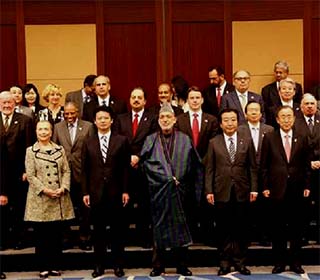Afghanistan faces a hard road ahead: Karzai
US plans to keep its assistance through 2017: Clinton
TOKYO - International donors offered $16 billion in development aid for Afghanistan on Sunday to show there will not be a mass exodus from the country after most foreign troops pull out in two years. They stressed the aid will be closely monitored to assure it is not squandered through corruption or mismanagement.
Donors from about 70 countries and organizations, at a one-day conference in Tokyo, set a baseline for aid in the crucial period through and beyond 2014, when most NATO-led foreign combat troops will leave and the country will assume responsibility for most of its own security.
President Hamid Karzai said the country faces a hard road ahead, but vowed to improve security and fight corruption as it moves toward a more self-reliant future.
The $16 billion through 2015 is near what the World Bank believes Afghanistan needs to close the gap between how much money it can afford and how much it needs to sustain its transition. The Japanese hosts had said before the conference that they hoped to get pledges of nearly $4 billion per year, so the result was roughly what they had expected.
A follow-up meeting is to be held in Britain in 2014.
"I am encouraged that the member states are willing to mobilize $16 billion," said U.N. Secretary-General Ban Ki-moon. "Afghanistan has made important progress, but the gains are fragile."
U.S. Secretary of State Hillary Rodham Clinton said the United States, which is by far the largest donor, plans to keep its assistance through 2017 near the average amount it has been over the last decade, which would likely be under $2 billion a year.
Japan, the second-largest donor, says it will provide up to $3 billion through 2016. Germany has announced it will keep its contribution to rebuilding and development at its current level of $536 million a year, at least until 2016. The Asian Development Bank announced it is providing $1.2 billion through 2016.
Clinton, who arrived in Tokyo a day earlier from Kabul, said Afghan security "cannot only be measured by the absence of war."
"It has to be measured by whether people have jobs and economic opportunity; whether they believe the government is meeting their needs," she said.
But the donors at the gathering also expressed strong concerns over how the money will be handled. The meeting in Britain in 2014 will check progress toward "mutual accountability" and a review and monitoring process to assure that development aid is not diverted by corrupt officials or mismanaged — both of which have been major hurdles in putting aid projects into practice thus far.
Afghanistan, one of the world's 10 poorest countries, has received nearly $60 billion in civilian aid since 2002. The World Bank says foreign aid makes up nearly the equivalent of the country's gross domestic product.
The donors in Tokyo stressed that the aid has made a difference.
In the decade since the U.S. invasion in 2001, there have been major improvements in education and health care, with nearly 8 million children, including 3 million girls, enrolled in schools. That compares with 1 million children more than a decade ago, when girls were banned from school under the Taliban.
Improved health facilities have halved child mortality and expanded basic health services to nearly 60 percent of the population of more than 25 million, compared to less than 10 percent in 2001. (Agencies)

